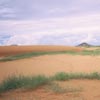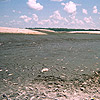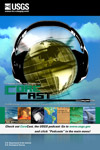USGS CoreCast
It's natural science from the inside out.
USGS Podcasts Home > CoreCast Home Page
Can't see Flash? Install Flash Player.
Next page
|
94
|

Climate change is increasing the mobility of sand dunes in the southwest, posing threats to roadways, infrastructure, human health, cultural practices of the Navajo Nation, and much more. Vegetation on dunes serves as stabilizers, but as the climate warms and precipitation decreases, there is less vegetation growth. USGS scientist Margaret Hiza and intern Leanna Begay discuss their research to understand the dunes' plant diversity and what changes are occurring. (8:47) |
Transcript/Links | |
|
89
|

A new method to assess the Nation's potential for storing carbon dioxide in rocks below the earth's surface could help lessen climate change impacts. The injection and storage of liquid carbon dioxide into subsurface rocks is known as geologic carbon sequestration. USGS scientist Robert Burruss discusses this new methodology and how it can help mitigate climate change. (5:44) |
Transcript/Links | |
|
87
|

This is the third and final installment of a three-part series on climate change. Slight changes in climate may cause abrupt changes in ecosystems that are not easily reversible. Some of these responses, including insect outbreaks, wildfire, and forest dieback, may adversely affect people as well as ecosystems and their plants and animals. USGS scientist Colleen Charles discusses a new report on the impacts of a warming world on ecosystems. Previous Episodes: Arctic Heats Up More than Other Places (Ep. 82); How Abrupt Can Climate Change Be? (Ep. 84) (6:39) |
Transcript/Links | |
|
85
|

Attention citizen scientists: We need your help watching the way the world changes! For nature, timing is everything. So how does climate change affect the timing of things like flowers blooming and animals migrating, and why is this so important? Learn more, and find out how YOU can help us by observing the world around you from USGS scientist Jake Weltzin, Director of the National Phenology Network. (9:46) |
Transcript/Links | |
|
84
|

The United States faces the potential for abrupt climate change in the 21st century that could pose clear risks to society in terms of our ability to adapt. USGS Associate Program Coordinator for the Office of Global Change John McGeehin discusses a new report on the potential for abrupt climate changes from global warming during this century. (8:41) |
Transcript/Links | |
|
82
|

Temperature change in the Arctic is happening at a greater rate than other places in the Northern Hemisphere, and this is expected to continue in the future. As a result, glacier and ice-sheet melting, sea-ice retreat, coastal erosion and sea level rise can be expected to continue. USGS scientist Joan Fitzpatrick discusses a new report on past climate variability and change in the Arctic. (11:15) |
Transcript/Links | |
|
77
|

More accurate predictions of future climate and improved understanding of today’s warming are possible with new data from the first comprehensive reconstruction of an extreme warm period. Past warm periods provide real data on climate change and are natural laboratories for understanding the global climate system. USGS scientists Harry Dowsett and Marci Robinson discuss this research and implications. (7:08) |
Transcript/Links | |
|
68
|

Long-standing farming practices in California's Sacramento-San Joaquin River Delta expose fragile peat soils to wind, rain and cultivation, emit carbon dioxide (CO2) and cause land subsidence. To capture or contain the carbon, farmers would "grow" wetlands. In doing so, they would begin to rebuild the Delta's unique peat soils, take CO2 out of the atmosphere, ease pressure on the Delta's aging levees, and infuse the region with new economic potential. We learn more from USGS bio-geochemist Robin Miller about how this could help California, the nation, and the world. (8:34) |
Transcript/Links | |
|
61
|

The USGS and the Coast Salish Tribal Nation have partnered during the annual Tribal Canoe Journey to study and help improve resources of the Salish Sea. This final episode in the Corecast Tribal Journey gives an overview of the journey, including a look at preliminary results and additional short video clips and commentary as they paddle through the San Juan Islands and British Columbia (in the Transcript section). Also available in: YouTube (6:41) |
Transcript/Links | |
|
34
|

In the second part of our two-part drought mini-series, we head down South to talk with USGS scientists Curtis Weaver and Brian McCallum about the drought situation in the Southeastern United States. We also learn some eye-opening economic implications of drought. (Did you know that it's possibly the most expensive natural hazard to address?) (18:06) |
Transcript/Links | |
Next page


